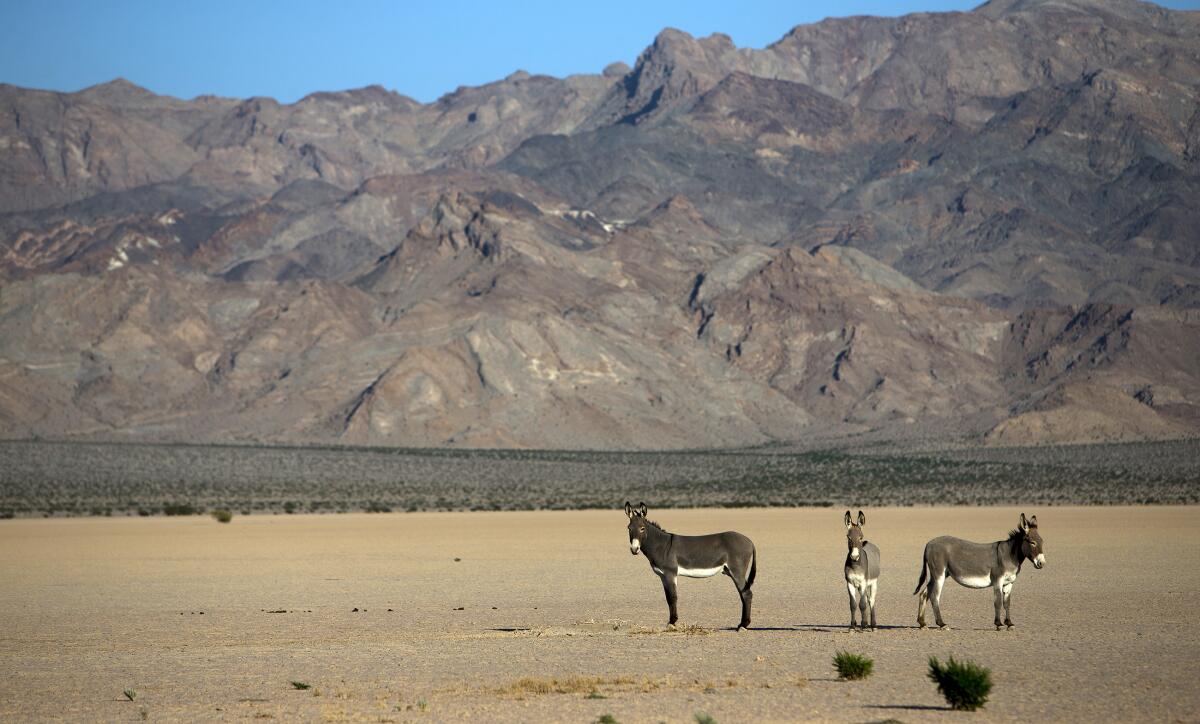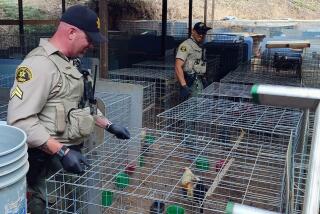More than 40 wild burros slaughtered in the Southern California desert; reward offered

- Share via
More than 40 wild burros have been found shot and killed along the Interstate 15 near the Nevada state line, Federal officials said on Friday, and they’ve offered a reward of up to $18,000 for information leading to the arrest and conviction of those responsible.
It is one of the largest killings of its kind on public land managed by the U.S. Bureau of Land Management in Southern California, officials said.
A total of 42 wild burro carcasses with gunshot wounds have been found in various states of decomposition near the freeway corridor through the Clark Mountain Herd Area managed by the Needles field office of the BLM.
“We will pursue every lead until we’ve arrested and prosecuted those responsible for these cruel, savage deaths,” said William Perry Pendley, the BLM’s Deputy Director for policy and programs, “and we welcome the public’s help to bring the perpetrator or perpetrators to justice.”
Details about the ongoing investigation were scarce. However, BLM officials said the burros, including several juveniles, were shot in the neck with a rifle.
Some were brought down while drinking water in the Halloran Springs area.
Animal protection organizations said they were outraged by the slaughter and have contributed thousands of dollars to the reward.
“It’s a travesty that these animals would be gunned down,” said Grace Kuhn, spokeswoman for the nonprofit American Wild Horse Campaign. “There’ve been isolated incidents before over the years, but nothing on this scale in memory.”
Neda DeMayo, president of the nonprofit Return to Freedom, said, “I’ve been told that at least one of the burros was still alive when it was discovered by a passerby. But it succumbed to its injuries by the time BLM investigators arrived on the scene.”
“It’s all so unbelievable,” she added. “Crazy. Hostile. Cruel.”
Burros are not native to the West’s deserts, but they became some its most valued resources: sure-footed in rugged terrain, capable of carrying heavy loads long distances, and withstanding extremes in temperatures of cold and heat.
In the 1920s and 30s, they were turned loose and replaced by Model-A Fords and other vehicles. Since then, they have multiplied without restraint with few predators to check their numbers.
With populations that doubled every four to five years, they’ve managed to survive by feeding on the sage and wild growth of the Mojave Desert.
By the 1950s, wanton slaughter of wild burros in California’s desert and mountains had reached such proportions that the Society for the Prevention of Cruelty to Animals pressed for legislation to protect the creatures from trigger-happy hunters.
One killing ground was Homewood Canyon, near Trona, about 240 miles northeast of Los Angeles, where the SPCA officials in 1953 reported a shocking scene: Over an area of 50 acres, they found 50 burro carcasses. Only a few had bullet holes in the head, indicating that most had been left wounded where they fell.
Today, the animals are protected from capture, branding, harassment or death under the Wild Free-Roaming Horses and Burros Act of 1971, which considers them an integral part of the natural system of public lands managed by the BLM.
Violations of the act are subject to a fine of up to $2,000, or imprisonment for up to one year, or both, for each count charged.
Anyone with information about this incident is asked to call the WeTip hotline at (800) 782-7463 or visit http://wetip.com.






